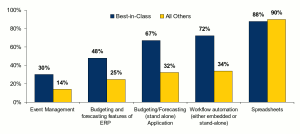
When Microsoft kicked off its second annual business intelligence (BI) summit in Seattle, it did so with the announcement of enhancing end-user BI capabilities with Gemini, an Excel-based interface that will enable on-the-fly pivot table functionality with point-and-click ease of use.
Organizations continue facing pressures to deliver timely information that effectively meets business goals. This requires companies to have access to the information, the ability to combine, aggregate and integrate this information, and then deliver it to people when, where and how they need it.
However, the IT and BI skill sets required to meet this demand are in limited supply, resulting in delayed, over-budget projects lacking the data and information necessary to meet business goals.
Microsoft’s plans to incorporate Gemini into the SQL Server and Office product stacks will transform how BI capabilities can be accessed throughout an organization. Instead of requiring users to learn complex BI tools in order to manipulate data, perform analysis and create reports that are then typically downloaded or pasted into Excel, Microsoft is now planning to deliver all of the capabilities directly within Excel itself.
Microsoft made its name by delivering products that were more intuitive or user friendly than its competitors. Spreadsheets remain the predominant technology in use today for budgeting and forecasting purposes, and are used at uniformly high levels by all companies, regardless of competitive status.
It is Microsoft’s Excel spreadsheet software that is one of the most popular and widely used software packages in the world.
Many end-user organizations have been incorporating Excel into their BI strategies from the beginning, and in many cases, BI capability is based on Excel functionality. Microsoft has recognized that if a majority of BI capabilities can be handled in Excel, end users will be presented with a very compelling offering.
In the July 2007 report, “Delivering Actionable Information to the Enterprise,” Aberdeen found that 32 percent of Best-in-Class organizations — those reporting the top 20 percent performance across several metrics — reported direct impact to revenue through increasing the number of people in the workforce with relevant BI skills sets. Excel’s dominance in the workplace means that gaining access to a trained workforce with relevant BI skills will be much easier.
Aberdeen Group has extensively researched companies’ use of Excel within a variety of BI environments. Excel remains the top BI tool in use today, and it is not being diminished despite BI technology vendors’ marketing efforts. In fact, most BI products on the market today include an “export to Excel” function as a standard feature, and end users report that the ability to export data to Excel is among the top solution selection criteria when it comes to the purchase of BI technology. Since most companies already have users that are highly skilled in Excel, users of Gemini will quickly migrate to a self-service BI capability and intuitively build their own BI solutions with minimal dependence on IT.
Spreadsheets Prevalent in Budgeting and Forecasting
Spreadsheets remain the predominant technology in use today for budgeting and forecasting purposes and are used at uniformly high levels by all companies, regardless of competitive status (Figure 1).
Best-in-Class companies have determined that spreadsheets are not as well-suited for some uses in the budgeting and forecasting process as they are in others. While it is accepted by many respondents that spreadsheets are suitable as input data sources, Best-in-Class companies are far less likely to use them for budget consolidation purposes, or as a method of communication and data transfer throughout the process.
End-users interviewed for this study agree that the likelihood of data corruption and human error is greater when budget and forecast information is shared within spreadsheets. Aberdeen research has revealed that these activities are far more likely to occur at Industry Average and Laggard companies where accuracy, agility, cost control and timeliness are suffering.
Spreadsheets, therefore, have their place in the budgeting process, but can also be the cause for serious problems.
Gemini, along with Microsoft’s other upcoming offerings, will give end users the ability to produce, consume and analyze results while allowing IT to capture business insights in the process. Its integration as one suite or through easily accessible interfaces will make the likelihood of errors less frequent, as consolidation of data becomes easier through the process.
Regardless of the fact that consolidation poses a problem, spreadsheets continue to play an important role in the budgeting and forecasting process, as shown in the April 2008 report, “Financial Planning and Budgeting.” While Best-in-Class companies are 45 percent less likely to use them as the sole means of communication through the process, 27 percent of all respondents indicate that spreadsheets are their primary method of creating budgets and forecast documents today, but are planning to replace this within 12 months (Figure 2).
The introduction of more Excel-based BI tools and uses of Excel for BI purposes, however, could change the role spreadsheets play in the near future, essentially giving them a longer shelf life.
Importance of Total Cost of Ownership
BI initiatives continue to be a top strategic activity among companies across all industries and geographies. Research conducted in December 2007 through January 2008 from over 4,300 companies found that BI is identified as the most important technology impacting businesses in the next two to five years (Figure 3).
The fact remains that businesses are concerned with the costs associated with implementing new BI initiatives and are looking for ways reduce hidden costs. The February 2008 Aberdeen Report, “Managing the TCO of Business Intelligence,” showed that adoption of BI initiatives is still a challenge for companies because of the need for IT support to handle the complexities involved in implementation and support.
The advent of Gemini makes it possible to reduce this total cost of ownership because its interface through Excel makes it easily integrated, which was seen as a top pressure in managing BI (Figure 4).
Lower TCO also comes from the ability to utilize existing investments in SQL Server, SharePoint and Office, which is expected to drive end-user adoption to dramatically bring down per-user costs and generate unprecedented economies of scale.
It is the top two pressures — that of integration between multiple applications and delivery of BI to more end users — that give Gemini its appeal. The integration of Gemini with Excel and SharePoint will make it possible to deliver BI to nontechnical users who are familiar with the MS Office applications they are using today.
“Microsoft’s goal is to transform the way companies think of BI through familiar and intuitive business-friendly tools that help them unlock the power of BI across their organizations,” Stephen Elop, president of the Microsoft business division, told the BI Summit’s attendees. “If you know how to use Word and Excel, then you’ll be able to use our BI.”
While Microsoft’s announcements represent compelling plans for their continued development of BI capabilities, companies should look at their organization to determine how to prepare for the future.
This includes the following:
- investigating “readiness” for Microsoft’s new BI releases, including the next version of SQL Server and additional capabilities to be announced regarding Office and Excel;
- assessing their own internal use of Excel for BI reporting and analysis purposes and determine how much need is already met with Excel vs. BI tools;
- challenging Microsoft and their partners to demonstrate how current BI tasks can be performed within the Gemini product, which may take some time as Microsoft does not plan to roll out prerelease versions of the software for several months; and
- challenging existing BI vendors to demonstrate and prove that their solutions are meeting the needs of the organization, and investigate whether those needs can or cannot be met by Gemini.
David Hatch is vice president and principal analyst of Aberdeen Group’s business intelligence practice. Andrew Stamer is a research associate in Aberdeen Group’s technology markets practice.
















































It is interesting to reflect on this post against the news earlier in the year that Microsoft were closing one of its entry level accounting packages.
The message coming out was that as most people did their accounts on Excel this should not be too much of an issue.